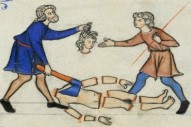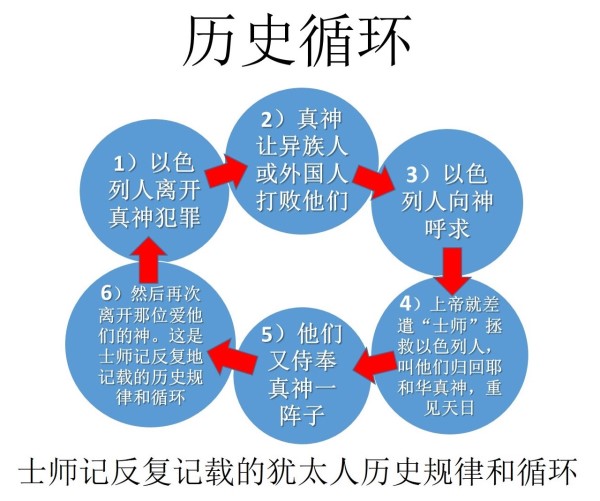 士师记第八课:个人任凭而行(下):士师记第十九章至第二十一章
士师记第八课:个人任凭而行(下):士师记第十九章至第二十一章
一。士师记19至21章:以色列人内战:
请先阅读士师记19章至21章。此段记载又是一个可悲的故事,让我们知道当时以色列人的道德观很低;“那时,以色列中没有王,各人任意而行”。注意年间:士师记20章27-28节让我们知道,那时,亚伦的孙子、以利亚撒的儿子非尼哈侍还活着。
二。士师记19章:利未人和他的妾:
利未人应该是侍奉神的。如果利未人已经这样陷入了泥沼,不知道别人如何!士师记19章至21章让我们知道一部分人道德情况如何。
1节:“一个利未人,娶了一个犹大伯利恒的女子为___”。在旧约《圣经》时代,有人娶妾,但是,神原来的“家庭计划”是一男一女,一夫一妻(参创世记2:23-24;出埃及记20:14)。今天,基督徒娶妾为罪;一夫多妻和一妻多夫都是罪(参马太福音5:31-32;19:3-12;哥林多前书7章)。
2节:女士对利未人怎么样?(注意:和合本“妾行淫离…”和普通话本“他的妾与他吵嘴…”翻译很不一样;此文接受和合本。)
3-10节:请述说丈夫如何前往岳父家把妾接回来。
11-21节:在耶布斯的时候,发生什么事?(此事让我们回想到创世记里面的谁?罗___。创世记第___章。)那些恶棍有什么计谋?家主反应如何?你认为家主怎么会这样做?你认为利未人怎么会这样做?你认为,当晚利未人睡着了没有?为什么?第二天,利未人发现妾已经___了。利未人回了家后,作什么?你对此事想法如何?此事是否很讽刺?譬如,利未人指责别人道德懒散,但是他自己呢?
三。士师记20章:十一打一:
一节:“从但到别是巴”意思相当于从南道北,从哈尔滨到昆明,从波士顿到洛杉矶。请在地图上指出“但”和“别是巴”。
1-48节:请详细的描述以色列人如何对待便雅悯人。第一天有多少人死?第二天?第三天?
35节:最后,多少便雅悯人死了?
47节:几位逃跑了?逃跑到哪里?
16节:“甩石”:NIV Study Bible 告诉我们当时的军人甩的石头有400多克重;可甩的速度有150-160公里快kph (90-100 mph)。(The NIV Study Bible, New International Version, Kenneth Barker, General Editor. Grand Rapids, MI, USA: Zondervan Bible Publishers, 1985, s. v. Judges 20:16, p. 360.)
四。士师记21章:十一协助一:
1节:以色列人曾经起了什么誓?打完战后,以色列人“悲痛地放声大哭”(普通话本)——是为了何事?请比较以色列人在士师记20:23, 26及在士师记21:2-3的两种态度。以色列人发现便雅悯人面对什么问题?请详细的述说以色列人怎么样解决这个问题。
25节:最后,士师记的作者下了什么结论?
请您对士师记所记载的历史下一个结论。

读者:欢迎您把这篇短文下载,复印,用在您的《圣经》班里。
Judges/08: “Everyone Did as He Saw Fit” /02
Judges Chapters nineteen through twenty-one
1. Judges 19-21: Domestic Warfare:
First read Judges 19-21. Once again we have a very sad story that shows us to what a low level of morality the Israelites had fallen; “In those days, Israel had no king; everyone did as he saw fit.” Note time frame: Phinehas, son of Eleazar, the son of Aaron, was still alive, as noted in Judges 20:27-28.
2.Judges 19: A Levite and His Concubine:
The Levites were supposed to serve God. If the Levites had sunk this far into the mud, what about other people! Judges 19-21 shows us the moral situation of some of the people.
V. 1: “Now a Levite who lived in a remote area in the hill country of Ephraim took a c__________ from Bethlehem in Judah.” Some men took concubines during the Old Testament period, however, God’s original plan for the home was one man/one woman, one husband/one wife (see Genesis 2:23-24; Exodus 20:14). Today, it is a sin for a Christians to take a concubine; both polygyny and polyandry are sins (see Matthew 5:31-32; 19:2-12; 1 Corinthians ch. 7).
V. 2: What did the woman do? (Note: The Union Version and the Putonghua Version translate this very differently; the Union Version says she committed adultery; the Putonghua Version says they had an argument. This lesson follows the Union Version. [Compare the KJV, RSV, NIV and NRSV for these same differences in English.])
Vs. 3-10: Describe how the husband went to the house of his father-in-law and got his concubine.
Vs. 11-21: What happened in Jebus? (Of what in Genesis does this remind us? L___. Genesis ch. ____.) What did those scoundrels have in mind? What the host’s reaction? In your opinion, how was the host able to do what he did? In your opinion, how could the Levite do what he did? Do you think the Levite slept soundly that night? Why? The next morning, the Levite discovered that his concubine was d____. What did he do after he returned home? What are your thoughts about all of this? Do you see any irony in this story? For example, the Levite scolded everyone else for their moral lethargy, but what about himself?
3.Joshua 20: Eleven Against One:
V. 1: “From Dan to Beersheba” means the same as from north to south, from Harbin to Kunming, from Boston to Los Angeles. Find Dan and Beersheba on a map.
Vs. 1-48: Tell in detail how the Israelites dealt with the Benjamites. How many people were killed on the first day? On the second day? On the third day?
V. 35: In the end, how many Benjamites died?
V. 47: How many escaped? To where did they escape?
V. 16: “Sling a stone”: The NIV Study Bible tells us that in those days, soldiers slung stones that weighed 400 grams or more and were slung at a speed of 150 to 160 kph (90-100 mph). (The NIV Study Bible, New International Version, Kenneth Barker, General Editor. Grand Rapids, MI, USA: Zondervan Bible Publishers, 1985, s. v. Judges 20:16, p. 360.)
4.Judges 21: Eleven Assist One:
V. 1: What oath had the Israelites taken? After the battle, why did the Israelites weep bitterly? [The Chinese quotation is from the Putonghua Version.] Compare the attitude of the Israelites in Judges 20:23, 26 with their attitude in Judges 21:2-3. What problem did the Israelites realize the Benjamites faced? Explain in detail how the Israelites solved this problem.
V. 25: With what conclusion did the author of Judges end the book? To what conclusion to you come regarding all that is recorded in Judges?
圣经问答
个人任凭而行(下)
士师记第八课:士师记第十九章至第二十一章
Bible Study Questions: Judges/08:
“Everyone Did as He Saw Fit” /02
Judges 19-21
作者:谢德华 ©By Edward Short
本文所问的问题使用汉子圣经。
欢迎您把此文下载用在圣经班或私人学习。
A series of Bible lessons, written in Chinese
and based largely on the text of the Chinese Bible.
You may download and print copies of this lesson
for use in your Bible class.
图片来自https://obscurecharacters.com/2016/05/18/a-dismembered-concubine/
